28 Dec 2022 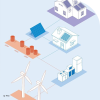
|
“More objectivity would be helpful” The current energy debate could do with more facts and less gut feeling – argue Thomas J. Schmidt, renewables expert, and Andreas Pautz, nuclear energy specialist. The current energy debate could do with more facts and less gut feeling – argue Thomas J. Schmidt, renewables expert and head of the PSI Energy and Environment Research Division, and Andreas Pautz, nuclear energy specialist and head of the PSI Nuclear Energy and Safety Research Division. In this joint interview, they set out the challenges that science needs to address in connection with the Swiss government’s Energy Strategy 2050 and why nuclear energy and renewables experts must work closely together. |
28 Dec 2022 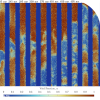
|
Award winning work on high-resolution X-ray radiography methods for boiling experiments at high pressure Light Water Reactors (LWRs) such as the ones operating in Switzerland work at relatively high temperatures and pressures. As a consequence, thermal-hydraulics experiments investigating relevant LWRs phenomena at prototypical conditions require test sections with relatively thick steel walls. This poses significant challenges for the implementation of suitable instrumentation to capture phenomena of interest, such as the flow regimes during transition from liquid to steam. The characterization of flow regimes in the presence of boiling is rather complex, and their better understanding would allow to develop mathematical modeling tools that can be used to optimize equipment and better assess safety margins. To perform in-situ measurements of the boiling process under high-pressure conditions, the team of authors from PSI, ETH, and the University of Michigan has developed a new high-fidelity and high-speed imaging system based on x-ray radiography, which provides high-resolution details on the boiling process while being non-intrusive. Since the instrumentation is located outside of the test section, it has also the advantage that can be easily moved to take measurements in different region of the test sections. |
28 Dec 2022 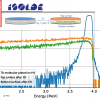
|
Synthesis of Metallic Lanthanide Thin Samples This work aimed to produce intermetallic samples of platinoid metals (active metal matrix) and lanthanides (co-metal) and via the method of Coupled Reduction, i.e. a thermal treatment of the combination of the lanthanide oxide and noble metal at high temperature, as high as 1100 °C, under a constant flow of H2. We have demonstrated by means of several techniques, such as Scanning Electron Microscope, Energy Dispersive X-Ray Spectroscopy, Alpha Spectrometry and Radiographic Imaging, that this method, at defined experimental conditions (temperature, pressure and concentration) yields a metallic lanthanide thin film when using platinum as active metal matrix. Conversely, the formation of a bulk intermetallic compound was obtained when using Pd as matrix. Those systems will have applications in different nuclear physic and radiochemistry studies, such as irradiation targets for production of superheavy elements and for nuclear data determination. |
28 Dec 2022 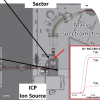
|
MC-EBIS-ICP-MS – a unique dual Ion Source Mass Spectrometer This highlight presents a successful, in-house developed integration of an Electron Beam Ion Source (EBIS) able to ionize gases to high charge states with a customized commercial MC-ICP-MS. The successful joining of the two ion flight paths is a milestone towards comprehensive routine analyses of solids, liquids, and gases using THE SAME MASS SPECTROMETER, the latter analyses free from atmospheric contamination. After implementation of an introduction system for gas mass spectrometry, routine analyses will comprise isotope ratio and relative abundance determinations of fission gases in used nuclear fuel. In addition to the unique versatility of the MC-EBIS-ICP-MS, inclusion of the EBIS further opens the little-studied field of mass spectrometry of highly charged ions. |
28 Dec 2022 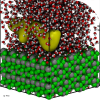
|
Deciphering the molecular mechanism of water boiling at heterogeneous interfaces Water boiling control evolution of natural geothermal systems is widely exploited in industrial processes due to the unique non-linear thermophysical behavior. Even though the properties of water both in the liquid and gas state have been extensively studied experimentally and by numerical simulations, there is still a fundamental knowledge gap in understanding the mechanism of the heterogeneous nucleate boiling controlling evaporation and condensation. In this study, the molecular mechanism of bubble nucleation at the hydrophilic and hydrophobic solid–water interface was determined by performing unbiased molecular dynamics simulations using the transition path sampling scheme. Analyzing the liquid to vapor transition path, the initiation of small void cavities (vapor bubbles nuclei) and their subsequent merging mechanism, leading to successively growing vacuum domains (vapor phase), has been elucidated. The simulations reveal the impact of the surface functionality on the adsorbed thin water molecules film structuring and the location of high probability nucleation sites. |
28 Dec 2022 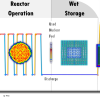
|
Taking good and safe care of the retired … nuclear fuel After several years of loyal and reliable services during heavy duty operation in a reactor, nuclear fuel must be discharged and go into retirement. For Switzerland, the final place of retirement is planned to consist of a deep geological repository where the used nuclear fuel will be disposed. Before the repository is constructed, the used fuel will need to be stored in wet pools and/or dry storage casks. During all this time, safe handling of the fuel will remain the top priority for operators and regulators. To gain better knowledge on the relevant phenomena which could potentially affect the fuel thermo-mechanics and safety characteristics during long storage periods as well as to allow predicting their evolution, simulation models are being developed at PSI within the DRYstars project. A first milestone was recently achieved with the development of models coupled to state-of-the-art fuel performance codes for each of the three main categories of phenomena considered as having high safety relevance for storage, namely helium behaviour, creep behaviour and hydrogen behaviour. |
31 Jan 2022 
|
LRC and BluAct explore innovative filter material Fission products from the PSI-SINQ gas-jet facility, as operated by LRC, were used to reveal the separation of relevant radionuclides from radioactively contaminated water. |
31 Jan 2022 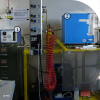
|
Hydrogen degassing of zirconium under high vacuum conditions At PSI, young scientists from experimental and modelling labs are working hand in hand in order to better understand the effect of hydrogen on the mechanical properties of zirconium alloys. |
31 Jan 2022 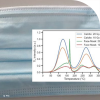
|
The common surgical face mask as emergency dosimeter The Department of Radiation Safety and Security at PSI proposes an additional use to the common surgical face. |
30 Aug 2021 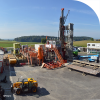
|
Safely stored for a million years Switzerland plans to construct an underground repository for its radioactive waste by 2050. Three sites are under consideration. Researchers at PSI are providing data that will help in determining which is most suitable. |
Pagination
- Previous page
- Page 2
- Next page
Copyright · All rights reserved